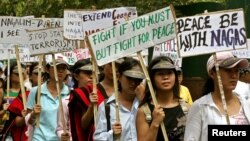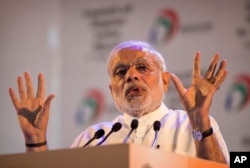Hopes of ending one of India's oldest insurgencies have risen with a landmark peace accord in the remote northeastern state of Nagaland. But questions remain whether the agreement will endure.
India's government has sealed the peace deal with the National Socialist Council of Nagaland, a feared insurgent group that has waged a violent struggle for an independent homeland for the Naga people for more than six decades.
Nagaland is one of seven remote northeastern states in which India has been battling several separatist rebel groups. The restive region borders China, Bangladesh, Myanmar and Bhutan.
Historic moment
After the peace accord was announced Monday, Prime Minister Narendra Modi said ending one of the oldest insurgencies is a “historic moment.”
Modi said he wants to develop a region that is the “guardian of India’s eastern frontier and a gateway to East Asian countries.”
“Peace, security and economic transformation of [the] northeast has been among my highest priorities. It is also at the heart of my foreign policy, especially the Act East Policy,” he said.
The rebellions in the northeast have held back the region’s development and hampered building roads and railways to East and South East Asian countries. Modi believes integrating India with these countries will boost the economy.
Lasting peace a toss-up
But political analysts say many hurdles lie ahead. The government did not give details of the peace deal reached with the Naga rebels, they had been demanding a homeland that included Naga-dominated parts of neighboring states.
Although the peace accord has been signed with a dominant rebel Naga group, other factions have not come on board. A rival Naga group that called off a 15-year truce with the government in March and has killed about 30 soldiers in separate attacks called the accord a “sell-out.”
Sanjoy Hazarika with the Center for Northeast Studies and Policy Research at New Delhi’s Jamia Millia Islamia University pointed out that two previous accords with the Nagas failed to deliver peace.
“There has been a lot of statesmanship and camaraderie shown, but the devil is always in the detail. I think there is ground for cautious optimism, but the details have to be spelled out. These are general principles, then it will have to be taken to the people, to the Naga civil society and the other groups for their endorsement,” Hazarika said.
But some hopes have been raised that the accord could give momentum to similar deals with other rebel groups in the northeast.
Prime Minister Modi said as “our oldest insurgency is getting resolved, it is a signal to other smaller groups to give up weapons."
"When we leave the path of dispute and take the high road of dialogue, it is a lesson and an inspiration in our troubled world,” Modi said.
Besides the northeast, India has also been battling separatists in Kashmir and is fighting Maoist rebels in the east of the country.





